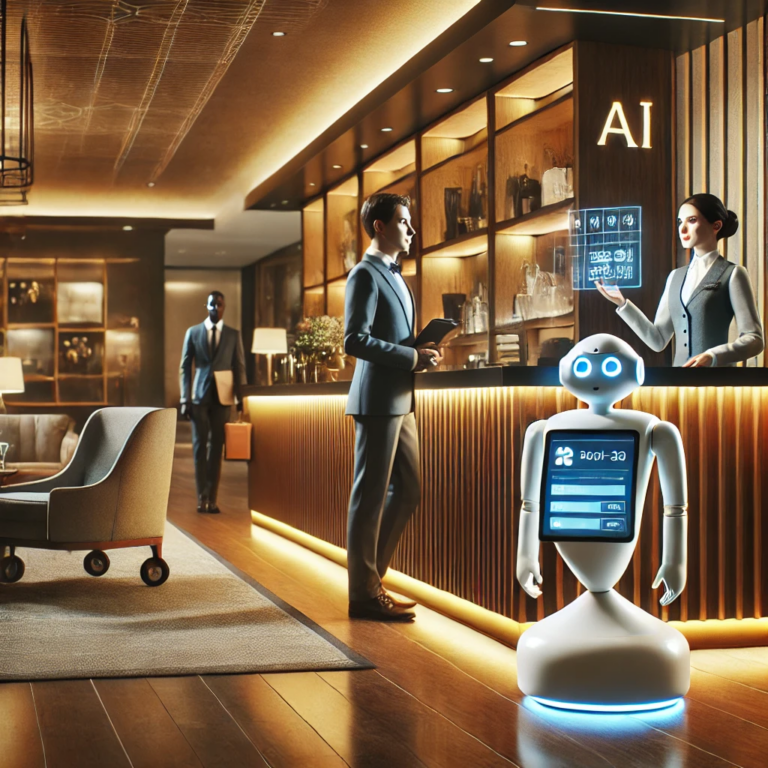As the hospitality industry becomes increasingly competitive, staying relevant requires adopting cutting-edge technology to enhance guest experiences and optimize operations. One technology leading this transformation is AI in Hospitality. From elevating operational efficiency to offering highly personalized guest experiences, AI in Hospitality is revolutionizing hotel management, setting a new standard for the guest journey.
This article explores the multifaceted ways AI in Hospitality is transforming the industry. With real-world applications that improve guest satisfaction, streamline processes, and boost hotel revenue, AI in Hospitality is becoming an indispensable tool in the digital age.
AI in Hospitality: An Overview
AI in Hospitality involves using artificial intelligence to improve hotel services, from guest interactions to internal management. Through data analysis, machine learning, and predictive technology, AI in Hospitality empowers hotels to anticipate guest needs, create tailored experiences, and ensure seamless operations. The growing array of AI-driven tools allows hotels to focus on their primary mission: delivering exceptional guest experiences.
AI in Hospitality has applications across all levels of hotel management, from front desk operations and housekeeping to customer service and marketing. As the industry evolves, AI in Hospitality will continue playing a critical role in enhancing both guest satisfaction and operational efficiency.
Key Applications of AI in Hospitality
1. Personalized Guest Experiences
One of the most compelling applications of AI in Hospitality is the ability to offer tailored experiences for each guest. Through advanced data analysis, AI in Hospitality allows hotels to capture guest preferences, behaviors, and feedback. This data-driven insight empowers hotels to anticipate guest needs and customize their experience accordingly.
AI-powered guest profiles enable staff to prepare rooms to specific guest preferences—such as preferred room temperature, types of pillows, and even the guest’s choice of snacks. Some hotels use AI-driven concierge systems to make personalized recommendations for dining, entertainment, and local experiences. By collecting and analyzing guest data, AI in Hospitality enables hotels to build memorable, personalized experiences that foster guest loyalty.
2. Enhanced Hotel Management and Staff Optimization
AI in Hospitality also revolutionizes the management of daily hotel operations. AI-powered platforms streamline housekeeping schedules, optimize front desk processes, and provide real-time data for decision-making. By using predictive analytics, AI in Hospitality helps hotels forecast occupancy rates, adjust room pricing, and improve resource allocation.
An essential aspect of AI in Hospitality is its impact on staff management. By automating routine tasks such as check-ins, room assignments, and maintenance scheduling, AI frees up employees to focus on guest interactions and high-value tasks. AI in Hospitality systems can even monitor staff performance and provide insights for enhancing productivity and guest satisfaction.
3. Advanced Security and Loss Prevention
Security is a top priority for any hotel, and AI in Hospitality has introduced significant advancements in this area. AI-driven security systems can monitor surveillance cameras, detect suspicious activities, and alert security staff in real time. This proactive approach to security not only improves guest safety but also reduces the potential for incidents.
Moreover, loss prevention is another critical area where AI in Hospitality plays an essential role. Solutions like Deliverback use AI to streamline the process of managing lost and found items, ensuring a smooth, efficient process for guests who misplace belongings during their stay. Let’s explore how Deliverback works and the specific benefits it offers both hotels and guests.
How Deliverback Leverages AI in Hospitality for Lost and Found
Deliverback is a prime example of how AI in Hospitality can enhance guest satisfaction by addressing a common but often frustrating aspect of hotel stays—lost items. By offering a seamless process for retrieving forgotten belongings, Deliverback helps hotels turn a potentially negative experience into a positive one, thus improving overall guest satisfaction.
Here’s how Deliverback’s AI-driven system works:
Lost Item Reporting: When a guest realizes they have left an item behind, they can easily submit a request through Deliverback’s platform. This request can be accessed from any device, making it convenient for guests to use immediately upon discovering a lost item.
AI-Powered Item Identification and Matching: Deliverback uses AI to match the reported item with the hotel’s lost and found inventory. By analyzing descriptions, images, and other identifying information, the system can accurately match reported items to those in the inventory. This eliminates the need for manual sorting and allows for quick item recovery.
Seamless Communication: The platform enables direct communication between the guest and hotel staff, streamlining the process of confirming ownership and arranging pickup or delivery. Through AI-powered chat systems, Deliverback also offers automated responses to common questions, ensuring guests stay informed throughout the process.
Automated Tracking and Delivery: Once the item is matched and verified, Deliverback handles the logistics of returning it to the guest. The AI system can track the item through every stage, from hotel inventory to final delivery, ensuring transparency and reliability. This automated tracking adds an extra layer of security, giving guests peace of mind.
Deliverback is a valuable AI in Hospitality tool because it saves hotel staff time, reduces lost item inquiries, and ultimately provides a memorable service for guests. By focusing on a common guest pain point, Deliverback highlights how AI in Hospitality can turn challenges into opportunities for improved guest satisfaction.
Additional Real-World Examples of AI in Hospitality
The impact of AI in Hospitality is being felt across the industry, with various examples showcasing how AI-powered solutions are reshaping hotel operations and guest services:
Smart Chatbots and Virtual Assistants: AI-powered chatbots are commonly used in hotels to handle guest inquiries, room service requests, and reservation changes. By operating 24/7, these virtual assistants enhance responsiveness and free up hotel staff for other tasks.
Smart Room Features: Many hotels now offer AI-driven “smart rooms” where guests can control lighting, temperature, and entertainment options through voice commands. AI in Hospitality enables these systems to adapt to individual guest preferences, creating a customized experience with minimal effort.
Predictive Analytics for Revenue Management: AI in Hospitality provides hotels with predictive analytics tools that forecast demand, allowing for dynamic pricing adjustments. This enables hotels to maximize revenue while maintaining high occupancy rates, demonstrating a strategic use of AI in revenue management.
Robotics for Contactless Services: AI-driven robots are being used in some hotels to handle tasks like delivering room service, managing luggage, and even providing information about hotel amenities. This application of AI in Hospitality is both practical and unique, giving guests an innovative experience while reducing contact.
Automated Housekeeping Schedules: AI in Hospitality optimizes housekeeping by dynamically scheduling cleaning tasks based on guest check-ins and check-outs. This ensures rooms are prepared promptly and allows for better staff allocation.
Sentiment Analysis for Guest Feedback: AI in Hospitality can analyze guest reviews and feedback in real time, identifying areas for improvement. By understanding guest sentiment, hotels can make data-driven changes that enhance the guest experience and improve ratings.
Future Trends in AI in Hospitality
As AI in Hospitality continues to evolve, new trends are shaping the future of the industry. These developments promise to make hotel management even more efficient and guest experiences more memorable:
Hyper-Personalization: AI in Hospitality will enable hotels to go beyond basic personalization, allowing for a hyper-customized experience. Hotels will be able to use real-time data to adjust everything from room ambiance to dining options, making each stay unique.
Sustainability Management: AI in Hospitality is increasingly focused on sustainability. From monitoring energy usage to automating water conservation efforts, AI-driven tools are helping hotels achieve eco-friendly goals while reducing costs.
Integration with Augmented Reality (AR): AR combined with AI in Hospitality allows guests to take virtual tours of the hotel before booking, visualizing amenities and accommodations in advance. This trend is expected to revolutionize the booking experience.
Enhanced Privacy and Data Security: As AI in Hospitality collects more data, ensuring guest privacy is crucial. AI systems will incorporate advanced encryption and data protection protocols, securing guest information and building trust.
Voice Recognition for Guest Interactions: The future of AI in Hospitality includes more advanced voice recognition, allowing guests to interact with hotel services using natural language. This trend promises a more intuitive and convenient guest experience.
Conclusion
The adoption of AI in Hospitality is reshaping the industry, enhancing guest experiences, improving efficiency, and providing hotels with a competitive edge. With applications that range from personalized guest experiences to predictive analytics and security enhancements, AI in Hospitality is quickly becoming an essential part of modern hotel management.
Solutions like Deliverback exemplify how AI in Hospitality can address common guest frustrations, turning challenges into opportunities for memorable service. By providing a seamless process for retrieving lost items, Deliverback strengthens guest satisfaction and enhances the hotel’s reputation for service excellence.
AI in Hospitality isn’t just about adopting the latest technology—it’s about rethinking how hotels interact with guests, streamline operations, and meet modern expectations. As hotels continue to integrate AI-driven solutions, they are well-equipped to deliver extraordinary experiences that meet the needs of today’s tech-savvy travelers. With the potential to transform every aspect of the hotel industry, AI in Hospitality is not only a valuable tool but a cornerstone of the future in hospitality management.


